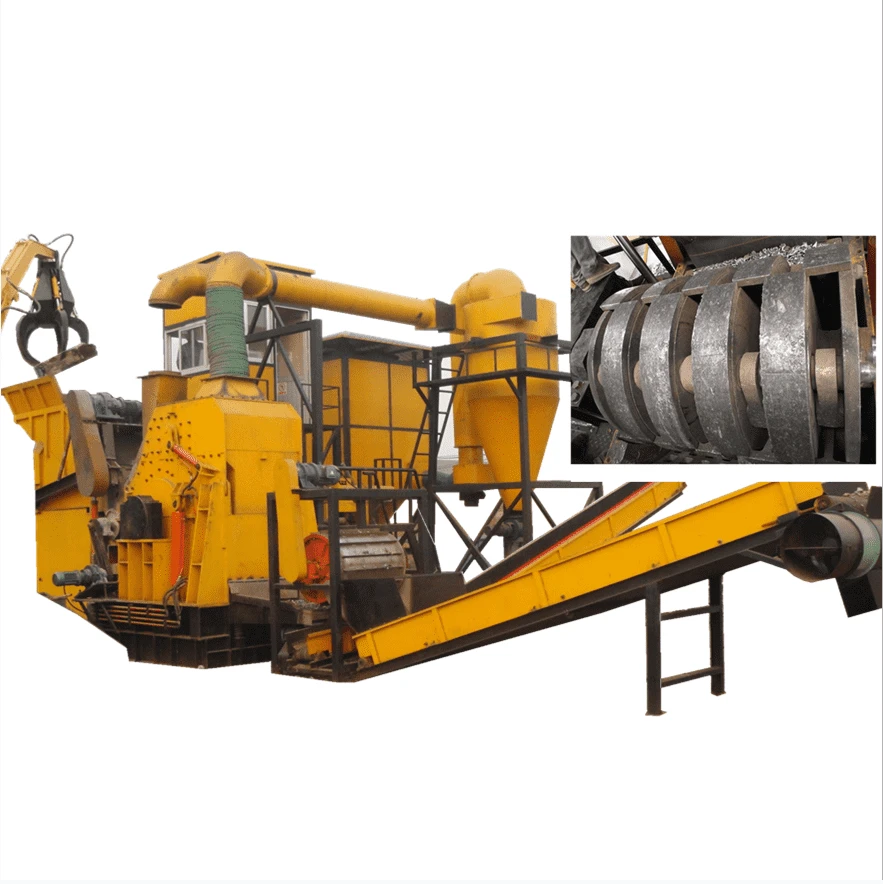
10 月 . 07, 2024 00:54 Back to list
The Role of Scrap Shredders in Recycling and Waste Management
In today’s world, the need for efficient waste management and recycling practices has never been more pressing. With the proliferation of consumer goods and rapid industrial growth, the amount of waste generated has reached staggering levels. One of the critical components of modern recycling processes is the scrap shredder, a powerful machine designed to reduce large materials into manageable pieces for further processing.
What is a Scrap Shredder?
A scrap shredder is a heavy-duty machine that crushes and shreds various types of materials, primarily metal, plastic, and electronic waste. The primary function of these machines is to break down bulky items into smaller, more compact sizes that can be easily transported and processed. This reduction in size not only makes transportation more efficient but also prepares materials for recycling or disposal.
Scrap shredders come in various sizes and configurations, depending on the specific needs of the facility using them. Some are designed for small operations, while others are built for high-capacity industrial applications. Advanced machines can process a wide range of materials, including scrap metal, aluminum cans, car parts, and even large appliances.
How Do Scrap Shredders Work?
Scrap shredders operate using a series of sharp, rotating blades that slice through tough materials. The incoming materials are fed into a hopper, where the shredding process begins. As the materials are pulled into the machine, they encounter the blades, which rotate at high speeds to shred them into smaller pieces. The size of the output can be adjusted by changing the screen settings or using different blade configurations.
One of the significant advantages of using a scrap shredder is its ability to handle various types of waste simultaneously
. Whether it’s ferrous or non-ferrous metals, plastics, or mixed materials, these machines can efficiently process them, enabling recyclers to maximize their recovery rates.
Environmental Impact
The environmental benefits of scrap shredders are substantial. For one, by facilitating the recycling process, they help conserve natural resources and reduce the need for new raw materials. For instance, recycling scrap metal reduces the energy consumption associated with mining and processing virgin ores. Studies have shown that recycling aluminum can save up to 95% of the energy needed to produce new aluminum from bauxite ore.
Moreover, shredding materials ensures that they are freed from contaminants, making them easier to process and recycle. By breaking down materials into smaller pieces, shredder operators can ensure higher quality end products, which are more desirable in the recycling market. This contributes to a more circular economy, where materials are reused and repurposed rather than ending up in landfills.
Challenges in the Industry
Despite their advantages, scrap shredders face several challenges. One of the primary concerns is the rising cost of maintenance and operation. Shredders require regular upkeep to ensure efficient performance, which can be costly. Additionally, with the rapid advancement of technology, industries must continuously invest in new machinery to stay competitive.
Another challenge includes regulatory compliance. As governments tighten regulations on waste management and recycling, scrap shredders need to comply with stringent environmental standards. This requires additional investment in technology and processes to reduce emissions and ensure responsible disposal of hazardous materials.
Conclusion
Overall, scrap shredders play a vital role in the recycling and waste management industry. They enhance the efficiency of material processing, minimize environmental impact, and support sustainable practices. As the world continues to grapple with waste and resource depletion, the importance of effective recycling solutions, including scrap shredding technology, cannot be overstated. Investing in modern shredder technology and ensuring compliance with environmental regulations will be crucial for industries aiming to contribute positively to both the economy and the environment in the coming years. By embracing innovations in scrap shredding, we move one step closer to a more sustainable future.
Latest news
Unveiling the Power of Eddy Current Separator
NewsSep.25,2024
Transform Your Home Recyclin:home metal shredder
NewsSep.25,2024
The Future of Waste Management with Recycling Line Picker
NewsSep.25,2024
The Benefits of a Metal Recycling Plant
NewsSep.25,2024
Revolutionize Material Separation with Onwang Technology
NewsSep.25,2024
Innovative Waste Management: Unveiling the MSW Sorting Plant
NewsSep.25,2024